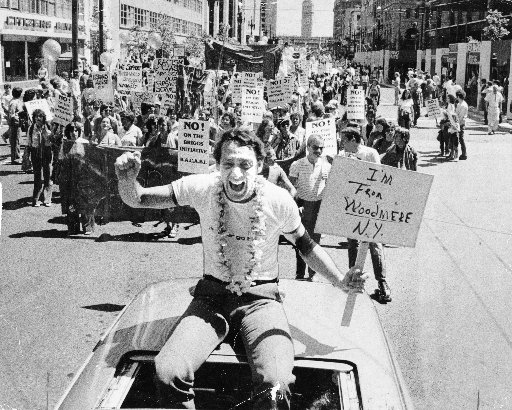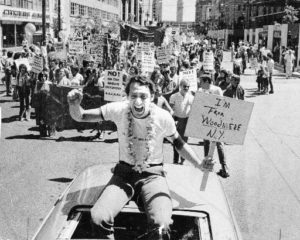

In his day, Harvey Milk grew to become arguably the most famous gay person in world, and ultimately a martyr for the cause of gay liberation. But he didn’t become active in gay politics until he was 40, less than a decade before his death.
Early Years
Harvey Milk was born on Long Island, New York, to Lithuanian Jewish parents, William Milk and Minerva Karns, on May 22, 1930. After graduating high school in 1947 and then New York State College for Teachers, graduating in 1951, he enlisted in the U.S. Navy during the Korean War, serving on a submarine as a diving officer and then as a Navy diving instructor in San Diego. Though he would later occasionally claim to have been dishonorably discharged because of being gay, in fact, Milk was not politically active at the time and it appears he was routinely honorably discharged at the end of his tour of duty in 1955.
For a time, Milk worked as a teacher, dating and living with Joe Campbell for six years in what would be his longest relationship. They lived briefly in Texas before moving back to New York where Milk worked for an insurance company.
After a stint of other relationships and other jobs, including working on Wall Street for Bache & Company and campaigning for Barry Goldwater’s 1964 Presidential campaign, and then working backstage with the traveling production of Hair, which brought him to San Francisco for the first time.
Enchanted with San Francisco, he decided to stay, working briefly at an investment firm, but when he started to become a hippie and refused to cut his hair, he was fired in 1970.
After drifting for a bit between California and Texas and New York, he eventually met Scott Smith in New York City. The two of them decided to move to San Francisco, where they invested the last of their money opening a camera shop at 575 Castro Street in 1973.
San Francisco Activism
As the owner of a small business, Milk quickly became frustrated with the San Francisco’s bureaucracy, and that drove him into political activism. In 1973, he ran for the San Francisco Board of Supervisors without the support of the City’s more established gays, who advocated making alliances with straight allies rather than antagonizing them trying to elect one of their own. Milk finished tenth out of 32 candidates, earning 16,900 votes.
Though he wasn’t elected, Milk remained politically active. He made alliances with the Teamsters Union and their strike against Coors Beer by organizing gay bars into refusing to sell the beer. The boycott was a success and in exchange, the Teamsters agreed to hire openly-gay employees. He founded the Castro Village Association when the Eureka Valley Merchants Association proved to be hostile to gay businesses. And in 1974 he organized the Castro Street Fair, the City’s first annual neighborhood street fair.
In 1975, Milk ran again for the Board of Supervisors, this time cutting his hair in order to be considered a serious candidate. He finished seventh, narrowly missing taking one of the six open seats. Newly-elected Mayor George Moscone visited his election headquarters that night, a clear demonstration of the LGBT community’s growing political clout.
In 1976, Moscone appointed Milk to the Board of Permit Appeals, one of the most powerful city commissions. But he only served for five weeks; Moscone fired him when Milk announced he was running for the Democratic Primary nomination for State Assembly against Moscone’s chosen candidate, Art Agnos. (In Moscone’s defense, the Mayor had also previously announced that he would not allow city commissioners to continue to serve while campaigning for elected office.)
In the end, Milk lost the nomination by less than 4,000 votes. Frustrated that the Alice B. Toklas Democratic Club, representing the City’s more moderate “establishment gays,” refused to endorse him, he founded the San Francisco Gay Democratic Club, which after his death would be renamed the Lesbian, Gay, Bisexual, Transgender Democratic Club.
In November of 1976, San Francisco voters passed a ballot measure reorganizing the Board of Supervisors into 11 districts. (Previously, the 11 members were at elected at large, with half of the Board up for four-year-terms every two years.) Milk was the immediate front-runner for District 5, which included the Castro, and this time even the San Francisco Chronicle endorsed him. He won the election in November of 1977, earning 30% of the vote against 16 other candidates.
San Francisco Supervisor
Milk was sworn in as a San Francisco Supervisor on January 8, 1978, becoming the most high profile gay person in the country. But he served only 11 months before his assassination.
Milk was part of the Board’s more liberal faction, which also included Carol Ruth Silver, the Board’s first single mother; Gordon Lau, the Board’s first Chinese-American; and Ella Hill Hutch, the Board first African American woman. But the five liberals were outnumbered by six more moderate/conservatives, including Dianne Feinstein, who was elected President of the Board, and Dan White, a former police officer and fire fighter.
During his tenure, Milk was able to pass a comprehensive gay rights ordinance protecting employment and housing discrimination based on sexual orientation in the private sector. He sponsored the “pooper scooper” law requiring dog owners to clean up after their pets in public. He actively made alliances with other minority interests, supporting, for example, measures to provide multilingual ballot materials.
When State Senator John Briggs, a failed candidate for California Governor, qualified Prop 6 for the ballot, an initiative that would have prevented gays and lesbians from serving as public school teachers, Milk became the co-chair of the No on 6 campaign with Sally Gearhart, a tenured professor at San Francisco State. Prop. 6 lost by over a million votes, with 75% of San Francisco voters voting against it.
Assassination
On November 10, 1978, Supervisor Dan White resigned as a member of the Board of Supervisors on the grounds that the part-time salary of $9,600 was a financial hardship for his family (despite voting against a measure that would have raised supervisors’ salaries).
A few days later, White’s political cronies pressured him to ask Mayor George Moscone for his old job back. Milk in turn argued that Moscone should appoint a more liberal replacement that would support Moscone’s political agenda.
Moscone intended to announce White’s replacement at a press conference on November 27, 1978. But before the press conference, White entered City Hall not through the front door, which had metal detectors, but through an open basement window. After arguing with Mayor, White shot him four times, twice in the head. He then went to his former office, reloaded his revolver, and then asked Milk to have a word with him. He shot Milk five times, twice in the head at close range.
Later that day, White turned himself into the police and was arrested for murder.
The Board elected Dianne Feinstein as Mayor. She appointed Milk ally Harry Britt as his replacement along with two moderate/conservative replacements for herself and White.
White Night Riots
After his arrest, Dan White’s former police colleagues openly wore “Free Dan White” t-shirts. Gays and ethnic minorities were excluded from the jury pool which ended up being mostly white, middle class conservative Catholics. White’s defense argued that he suffered from “diminished capacity” due to mental anguish caused by double-dealing politicians (despite being in the majority faction on the Board).
The defense argued that the normally-health conscious White’s consumption of junk food was evidence of his diminished capacity in what became known as the “Twinkie Defense.” (Despite popular misconception, the Twinkie Defense was offered as a symptom of his diminished capacity, not a cause of it.)
On May 21, 1979 — the day before what would have been Harvey Milk’s 49th birthday — the jury convicted Dan White of voluntary manslaughter rather than first degree murder. With good behavior, he could be out in five years.
The City’s gay community erupted in anger. Some rioted at City Hall, setting police cars on fire and trying to batter down the doors to City Hall.
Hours later, police in riot gear marched to the Castro in retaliation. The Twin Peaks Tavern managed to protect their patrons by turning off the lights and having their customers hide on the floors. The Elephant Walk wasn’t so lucky; police storm through the windows, shattering them and battering patrons right and left. More than a hundred gay residents ended up hospitalized. In 1984, the City finally settled with the Elephant Walk for a paltry $139,500 to cover their damages.
Tributes
The City has numerous tributes for Harvey Milk. Plaques have been placed in front of his old camera store at 575 Castro Street, with a mural of Harvey painted outside the apartment above where he lived. The plaza outside of the Castro MUNI Station has been renamed Harvey Milk Plaza. The San Francisco Gay Democratic Club changed its name to the Harvey Milk Memorial Gay Democratic Club. The school at 19th and Collingwood has been renamed the Harvey Milk Civil Rights Academy.
In 2009, Governor Arnold Schwarzenegger signed legislation passed by the California Legislature making May 22 as Harvey Milk Day. That same year, President Barack Obama posthumously awarded Milk the Presidential Medal of Freedom. On May 22, 2014, the United States Post Office issued a stamp with an illustration of Milk, the first openly gay person to be on an official U.S. stamp.
Resources
Sources
Epstein, Robert (director). 1984. The Times of Harvey Milk [documentary]. United States: Image Entertainment.
Milk, Harvey (author) and Jason Edward Black, Charles E. Morris (editors), An Archive of Hope: Harvey Milk’s Speeches and Writings, University of California Press, 2013, 978-0520275492.
Milk, Harvey (author) and Vince Emery (editor), The Harvey Milk Interviews: In His Own Words, Vince Emery Productions, 2012, 978-0972589888.
Shilts, Randy, The Mayor of Castro Street: The Life and Times of Harvey Milk, St. Martin’s Griffin, 1982, 978-0312560850.
“The Elephant Walk,” Uncle Donald’s Castro Street.
Dramatizations
Sean Penn (Actor), Emile Hirsch (Actor), Gus Van Sant (Director). 2008. Milk [Motion picture]. United States: Focus Features.
